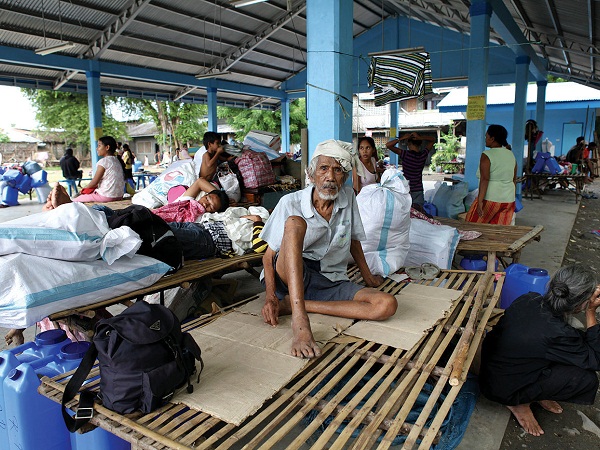
AN ELDERLY evacuee who has seen violence all his life rests in a shelter in Barangay Kauran in Ampatuan, Maguindanao. JEOFFREY MAITEM/INQUIRER MINDANAO
Orlando Santos was roused from sleep as his parents dragged him to safety. Outside their home in Barangay Saniag in Ampatuan, Maguindanao, armed men were on a rampage.
That was 42 years ago.
On Aug. 6, what Santos thought was a nightmare from a distant past came back.
Santos, now 48 years old, gathered his children and grandchildren to flee from their village as the sound of gunfire drew nearer. They were not able to go far, however, as members of the Bangsamoro Islamic Freedom Fighters (BIFF) caught up with them and other fleeing villagers and held them hostage for nine hours.
When his family and 500 other families finally made it to the evacuation center, Santos could not help but become emotional. “It’s like living in a detention cell—hopeless. Disrupted education for the children and other opportunities,” he said.
He said three generations of his family had lived through decades of violence in Maguindanao and he felt hopeless that there would ever be an end to the bloodshed.
Santos said that since he was 6 years old, his family had known no other life than one on the run, avoiding one clash after another.
When his father took the family back to Saniag in 1976, six years after fleeing from fighting in the village between Moro rebels and government soldiers, Santos said he thought his family would finally find peace. “I was wrong. A year later, we packed our things again because of rebel attacks and clashes with soldiers,” he said.
MNLF attack
In 1982, members of the Moro National Liberation Front (MNLF) attacked the village, driving away hundreds of residents.
“It’s like an on-and-off situation. After the military cleared the area and had dispersed the rebels, we go back to our normal life,” Santos said.
When negotiations with the MNLF succeeded in 1996, Santos said he thought the cycle of violence had ended. But the splinter Moro Islamic Liberation Front (MILF) was not part of the 1996 pact and the cycle started anew.
In 2000, then President Joseph Estrada declared an all-out war on the MILF and Santos had to herd his family to an evacuation center once more.
His son, Michael, is now 25 and has a family of his own. Michael said his first time evacuating as a child was too complicated to understand then.
“(But) as years go on, I understand little by little the reason why we always leave our community,” he said, as he looked at his son, John Michael, 5.
“My son was more than a year old when he experienced being an evacuee. I do not know when he will experience peace,” he said.
Peace talks
Marcel Buludan, now 45, said he, too, worried about the future of new generations of Maguindanaons.
Buludan said that as a child, he had suffered from trauma. He now sees his children and grandchildren suffering from the same. “When will this end?” he asked.
He said people wanted to pin their hopes on ongoing peace talks between the government and the MILF, but the violence that keeps driving them out of their homes is sapping their strength, even that which is needed to just hope.
“We believe that even if the government signs a peace agreement with the MILF, the problem in Mindanao will continue,” said Buludan.
“Look at what’s happening now. While the government is talking peace with the MILF, another group has emerged,” he said, referring to the BIFF of renegade MILF leader Ameril Umra Kato.
Mohagher Iqbal, MILF chief negotiator, said the only solution to the cycle of violence is a real solution to the Moro problems.
“It’s similar to the case of a sick patient. The doctor needs to figure out the root cause of the disease and give the patient the right prescriptions. We need the right autonomy where we can govern our own land… not the bogus autonomy and not necessarily separating Mindanao from the government,” Iqbal said.
Murad Ebrahim, MILF chair, earlier said that even if the MILF laid down its arms in a peace deal, new groups would emerge unless the Moro people get what they have been demanding for decades—their own territory under the concept of one nation, two governments.
“We are not trying to form a new nation, we simply want to govern on our own and decide what is best for us,” he said.